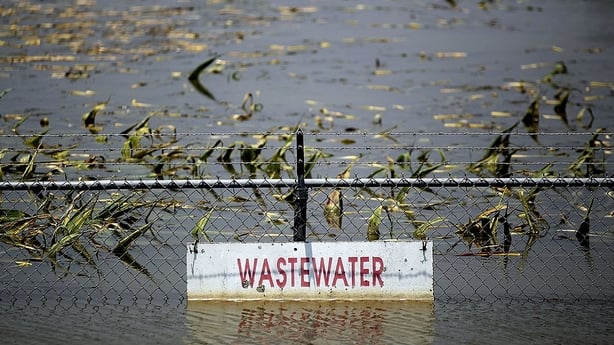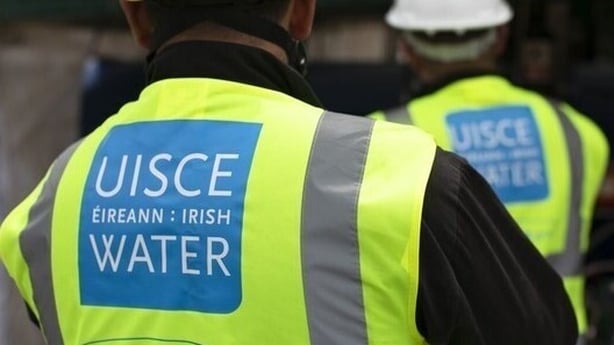The Environmental Protection Agency has said the slow pace of delivery of wastewater treatment upgrades by Uisce Éireann is unacceptable.
It says the more it delays fixing the issues causing wastewater discharges the more damage will be done to rivers, estuaries, lakes and coastal waters.
The EPA's Urban Wastewater Treatment report highlights that 16 towns and villages discharge raw sewage daily because their public sewers are not connected to treatment plants.
They are: Ballyvaughan and Kilkee in Co Clare; Ballycotton and Whitegate - Aghada in Cork; An Fál Carrach, Moville, Ramelton and Rathmullan in Co Donegal; Howth (Doldrum Bay) in Co Dublin; An Cheathrú Rua and Roundstone in Co Galway; Foynes and Glin in Co Limerick; Newport in Co Mayo; and Arklow and Avoca in Co Wicklow.
Yet in nearly half of those cases Uisce Éireann has extended the treatment date by between two and five years and does not plan to start working on a quarter of them until at least 2030.
Also 400 storm water overflows in sewers around the country do not meet the required standard to limit pollution.
The EPA says fixing these problems is taking too long and Uisce Éireann must shorten the timeline and accelerate the improvements needed.
The agency has identified 73 priority areas where urgent fixes are needed to protect the environment but Uisce Éireann has not yet started upgrade works at half of these.
The report, however, does note that Uisce Éireann has made significant progress in some cases.
It says 13 towns and villages that were discharging raw sewage have been connected to wastewater treatment plants since the start of 2023.
That represents a 45% reduction in the number of towns discharging raw sewage.
It also welcomes progress made upgrading Ireland’s largest treatment plant at Ringsend in Dublin which treats over 40% of all national wastewaters.
But it says the overall pace of progress is still not good enough.
Read the report in full here
EPA Director Dr Tom Ryan said Uisce Éireann must prioritise the prompt delivery of essential works and that its slow progress in designing and delivering the solutions is only prolonging the impact on water quality.
The EU Urban Waste Water Treatment Directive sets general European-wide treatment standards for large towns and cities.
Ten areas, including Dublin, failed these basic standards in 2023.
We need your consent to load this rte-player contentWe use rte-player to manage extra content that can set cookies on your device and collect data about your activity. Please review their details and accept them to load the content.Manage Preferences
EPA Programme Manager Noel Byrne said it is unacceptable that over half of licensed treatment plants fail the necessary standards, with issues ranging from short term breaches of treatment standards up to continuous discharges of raw sewage.
Mr Byrne said the short-term breaches should be resolved through effective management and maintenance of equipment.
"Uisce Éireann must address infrastructural deficits at the priority areas highlighted by the EPA during its 2025 to 2029 investment cycle. This will help deliver significant environmental benefits and protect water quality," he said.

10 main points in the report:
- Two decades is too long to wait to fix Ireland's deficient wastewater treatment plants.
- The number of towns and villages discharging raw sewage every day has reduced from 29 down to 16 since the beginning of 2023. About 12,000 people were connected to treatment during this period. Six more towns and villages are scheduled to receive treatment before the end of 2025. Uisce Éireann plans to provide treatment for all the remaining areas by 2030.
- Wastewater treatment at ten large towns and cities failed to meet European Union standards set to protect the environment. This is down from 15 areas in 2022.
- There are 34 priority areas where wastewater discharges are adversely impacting the quality of rivers, estuaries, lakes and coastal waters.
- Uisce Éireann’s delays in delivering improvements at priority areas where wastewater is adversely impacting rivers and coastal waters are prolonging risks to water quality.
- Wastewater discharged from over half of treatment plants did not always meet the licence standards set to prevent pollution.
- Three sewers or collecting systems must be upgraded to prevent sewage pollution at beaches with poor bathing water quality in 2023.
- 12 towns and villages where wastewater treatment must improve to protect critically endangered freshwater pearl mussels.
- Sewers in six towns and cities must be upgraded to protect the environment and address the findings of a 2019 judgement from the Court of Justice of the European Union.
- Uisce Éireann reported 1,141 short duration or once-off environmental incidents during 2023. Almost half were caused by equipment breakdowns and issues with the operation and maintenance of treatment plants.
Range of recommendations in report
The report includes a range of recommendations for Uisce Éireann, including the need to speed up its overdue assessments of how wastewater discharges impact shellfish waters, and to collect better information about discharges of untreated wastewater through storm water overflows.
In a statement, Uisce Éireann said it acknowledges and supports the EPA’s comments that wastewater infrastructure will require significant and sustained national investment in the years to come to bring all treatment systems up to the necessary standards.
It added that ending raw sewage discharges and increasing compliance with the Urban Wastewater Treatment Directive remain its priorities.
It also said today’s EPA Wastewater Report highlights the significant progress it is has made so far in addressing decades of under-investment in wastewater infrastructure.

The progress made includes; the elimination of raw sewage discharges in 82% of areas, 94% of wastewater treatment plants compliant with the EU Urban Wastewater Treatment Directive and 136 new wastewater treatment plants built or upgraded since 2014.
Uisce Éireann said multi-billion euro investment will be required over many decades to achieve necessary standards and address the issues highlighted in the EPA report.







